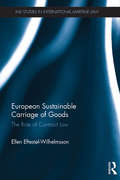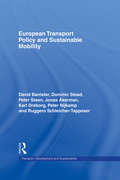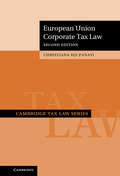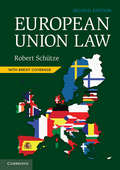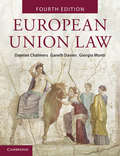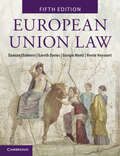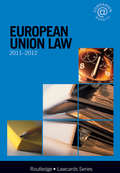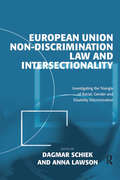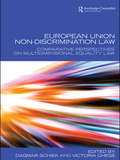- Table View
- List View
European Sports Law
by Stephen WeatherillEuropean Sports Law: Collected Papers 2nd edition contains the collected works (1989-2012) of Stephen Weatherill, Jacques Delors Professor of European Community Law, Somerville College, University of Oxford, United Kingdom, with an extensive introduction on the background and rationale for the selected papers. Stephen Weatherill is a leading academic and author on the subject of European Union law and professional sport. His work is of the highest academic standard and practice-oriented at the same time, which has a strong impact on major court cases and the development of international sports law in general. The updated 2nd edition is a vademecum for those involved with international sport and the challenges European law and sport provide and is an indispensable tool for administrators, managers, researchers, academics, marketers, broadcasters, advisers and practitioners. The book appears in the ASSER International Sports Law Series (ISSN: 1874-6926), under the editorship of Dr. David McArdle, Dr. Ben Van Rompuy and Marco van der Harst LL. M.
European States and Their Muslim Citizens
by John R. Bowen John R. Bowen Christophe Bertossi Jan Willem Duyvendak Mona Lena Krook Christophe Bertossi Jan Willem DuyvendakThis book responds to the often loud debates about the place of Muslims in Western Europe by proposing an analysis based in institutions, including schools, courts, hospitals, the military, electoral politics, the labor market, and civic education courses. The contributors consider the way people draw on practical schemas regarding others in their midst who are often categorized as Muslims. Chapters based on fieldwork and policy analysis across several countries examine how people interact in their everyday work lives, where they construct moral boundaries, and how they formulate policies concerning tolerable diversity, immigration, discrimination, and political representation. Rather than assuming that each country has its own national ideology that explains such interactions, contributors trace diverse pathways along which institutions complicate or disrupt allegedly consistent national ideologies. These studies shed light on how Muslims encounter particular faces and facets of the state as they go about their lives, seeking help and legitimacy as new citizens of a fast-changing Europe.
European Sustainable Carriage of Goods: The Role of Contract Law (IMLI Studies in International Maritime Law)
by Ellen Eftestøl-WilhelmssonThis work discusses the rapidly developing European transport policy on sustainable freight and the connected efforts initiated by the European Commission (EC) on greening transport by the means of contract law. Greening transport has been a central goal for the EU for decades. The main problem has been, and still is, that far too much carriage of goods within the EU is performed unimodally: by road carriage alone. This has caused severe problems particularly in central Europe, where both trade and environment is suffering from an ineffective transport industry with growing problems of congestion and pollution. A modal shift in transport from mainly road based to a form of transport in which more environmental friendly modes such as rail, inland waterways and sea born transport are integrated into one transport chain, is hence an objective of the EU. If successful, this model could then be extended to the international transport community. The key question raised in this book is whether the traditional role of contract law is changing to such an extent that the parties involved must take external interests into account. In the case of the EU’s efforts to enhance sustainable carriage of goods within its realm, the author explores whether governmental interference is necessary, or if we can trust that the parties will integrate environmental issues into their contracts because there is a demand for such clauses. The different proposals for an EU regime on multimodal contracts of carriage are discussed in this context. This book will be of great relevance to academics and practitioners with an interest in EU law, transport law, environmental law and maritime law in general.
European Transport Policy and Sustainable Mobility (Transport, Development and Sustainability Series)
by Peter Nijkamp Dominic Stead David Banister Jonas Akerman Karl Dreborg Ruggero Schleicher-Tappeser Peter SteenIt is now widely accepted that transport is becoming increasingly unsustainable and that strong policy intervention is required to reduce both the growth in transport demand and the environmental costs of transport. This book challenges conventional approaches to transport by moving away from trend based analysis towards the use of scenarios to identify alternative sustainable transport futures. It both summaries the development of EU transport policy and presents a critique. The policy context is widened to include the global changes taking place in economics, society and technology. It develops new methodologies for policy making for the next 25 years.
European Union Agencies as Global Actors: A Legal Study of the European Aviation Safety Agency, Frontex and Europol (Routledge Research in EU Law)
by Florin Coman-KundThis book examines a largely unexplored dimension of the European agencies, namely their role in EU external relations and on the international plane. International cooperation has become a salient feature of EU agencies triggering important legal questions regarding the scope and limits of their international dimension, the nature and effects of their international cooperation instruments, their status within the EU and on the global level, and leading potentially to tensions between EU law and international law. This book fills the existing knowledge gap by scrutinizing the international cooperation legal framework and practice of EU agencies, including their mandate, tasks and instruments, together with their legal status as actors with a global dimension. It sets out a general legal-analytical framework which combines legal parameters from EU and international law to assess EU agencies as global actors, and examines in detail three case studies on carefully selected agencies to shed light on the complexities of EU agencies’ daily international cooperation.
European Union Corporate Tax Law
by Christiana Hji PanayiHow does EU law affect Member State corporate tax systems and the cross-border activities of companies? This unique study traces the historical development of EU corporate tax law and provides an in-depth analysis of a number of issues affecting companies, groups of companies and permanent establishments. Existing legislation, soft-law and the case-law of the Court of Justice are examined. The proposed CCCTB Directive and its potential application through enhanced co-operation are also considered. In addition to the tax issues pertaining to direct investment, the author examines the taxation of passive investment income, corporate reorganisations, exit taxes and the restrictive effect of domestic anti-abuse regimes. By doing so, the convergences and divergences arising from the interplay of EU corporate tax law and international tax law, especially the OECD model, are uncovered and highlighted.
European Union Corporate Tax Law (Cambridge Tax Law Series)
by Christiana HJI PanayiHow does EU law affect Member State corporate tax systems and the cross-border activities of companies? This book traces the historical development of EU corporate tax law and provides an in-depth analysis of a number of issues affecting companies, groups of companies, and permanent establishments. Christiana HJI Panayi examines existing legislation, soft law, and the case law of the Court of Justice, as well as the Commission's burgeoning external tax policy initiatives. The book not only explores the tax issues pertaining to direct investment, but also analyzes the taxation of passive investment income, corporate reorganisations, exit taxes, and the treatment of anti-abuse regimes. Through this careful analysis, the book highlights the convergences and divergences arising from the interplay between EU corporate tax law and international tax law, especially the OECD model tax convention. This second edition also reviews developments in the context of the State aid prohibition and high-profile cases on tax rulings.
European Union Environmental Law: An Introduction to Key Selected Issues (European Business Law Library #7)
by Peter G.G. DaviesThis comprehensive book provides analysis and discussion on the following key issues in EU environmental law: environmental competence, principles and objectives, implementation and enforcement, nature protection, impact assessment, trade and the environment, waste management, climate change and the EU. An accessible work for all students of the subject both academic or professional.
European Union Health Law (Law in Context)
by Tamara K. Hervey Jean V. McHaleA contextual analysis of the internal logics of EU health law through four themes: consumerism; (human) rights; interactions between equality, solidarity and competition; and risk. Leading authors in the emergent field explain the interactions and implications of EU health law through thematic reinterpretation of the law in context in key substantive areas, such as the regulation of health research, access of patients to high quality care, health care professional regulation, organisation and funding of health care services, and public health. This book offers a fresh perspective and thorough understanding of EU health law through individual and collective or systemic perspectives, and covers health law both within the EU and globally. Essential reading for anyone interested in health law in any EU Member State or in global health law. First major study to conceptualise EU health law through its own terms, rather than those of health law or EU law. Structured around four themes which provide analytical focus and understanding of 'what is the law?' whilst considering the implications in various contexts. Easy to navigate quick reference guide which provides brief answers to the authors' 40 questions posed in the introduction.
European Union Internal Market
by Gareth DaviesFirst published in 2003. Routledge is an imprint of Taylor & Francis, an informa company.
European Union Internal Market Law
by Friedl Weiss Clemens KaupaThis is the market's most student-friendly textbook on EU internal market law, covering everything students need to know about the legal and regulatory framework of the internal market and eliminating the need for a full EU law text. Concise and focused, chapters explore the underlying socio-economic and historical contexts of EU law, and offer a thorough examination of the law's technical aspects, ensuring that students gain a rich understanding of the way that legal rules and structures have developed from key political and social debates. Key concepts are illustrated by excerpts, summaries and discussions of classic and modern cases. Numerous features include text boxes, illustrative cases, legal interpretations, tables, and suggestions for further reading, which support students with little background knowledge of the subject, leading them to total mastery of the material.
European Union Law
by Alina Kaczorowska-IrelandFully revised and updated, the third edition of EU Law provides an exhaustive, yet easily readable, account of the complex and ever changing subject of EU law. The author gives thorough, authoritative, and up-to-the-minute treatment to the institutional, constitutional and substantive elements of EU Law. The book is unique in that it successfully combines depth of coverage with an excellent selection of supporting case law, making this challenging subject accessible and easy to follow. Case summaries and judgments are highlighted in colour-tinted boxes for ease of reference, and are accompanied by key facts and analysis, often in the light of subsequent developments. The student-friendly approach is enhanced by market-driven pedagogical features, including:* Concise outlines, at the beginning of each chapter describing its content;* An aide-mémoire, often presented in diagrammatic form, at the end of each chapter to highlight and reinforce key points;* End of chapter recommended reading lists to facilitate further research;* End of chapter problem and essay questions testing the students' ability to apply what they have learnt; and,* A map identifying EU Member States, and their accession dates; acceding States; candidate States; and, potential candidate States. The book's companion website offers a range of teaching and learning resources including an interactive timeline of the EU, useful web links, self-test questions and much more. This book is essential reading for those studying EU law on both undergraduate and postgraduate courses and will be of interest to students of political science, social science and business studies. It also provides comprehensive coverage of substantive and procedural EU competition law and thus has its place as a textbook for introductory courses on EU competition law.
European Union Law
by Alina Kaczorowska-IrelandThe fourth edition of this well established and highly regarded work on EU law maintains its character by combining comprehensive yet accessible coverage with in-depth analysis of the law and student-friendly pedagogy. It is fully up to date so encompassing critical examination of new important judgments of EU and national courts and developments in institutional, constitutional and substantive EU Law. The book keeps its unique style in that it is both a textbook and a casebook. Case summaries are highlighted in colour-tinted boxes for ease of reference, and are accompanied by key facts and critical analysis, often in the light of subsequent developments. The student-friendly approach is enhanced by market-driven pedagogical features, including: Concise outlines, at the beginning of each chapter describing its content and assisting in revision; An aide-mémoire, often presented in diagrammatic form, at the end of each chapter to highlight and reinforce key points; End of chapter recommended reading lists to encourage and facilitate further research; End of chapter problem and essay questions testing the students’ ability to apply what they have learnt; Cross-references to show how topics are interrelated; and A map identifying EU Member States, candidate States; and, potential candidate States. The book’s companion website offers a range of teaching and learning resources including an interactive timeline of the EU, useful web links, self-test questions and much more. This book is essential reading for those studying EU law on both undergraduate and postgraduate courses and will be of interest to students of political science, social science and business studies.
European Union Law
by Gareth Davies Damian Chalmers Giorgio MontiThis eagerly awaited new edition has been significantly revised after extensive user feedback to meet current teaching requirements. The first major textbook to be published since the rejuvenation of the Lisbon Treaty, it retains the best elements of the first edition - the engaging, easily understandable writing style, extracts from a variety of sources showing the creation, interpretation and application of the law and comprehensive coverage. In addition it has separate chapters on EU law in national courts, governance and external relations reflecting the new directions in which the field is moving. The examination of the free movement of goods and competition law has been restructured. Chapter introductions clearly set out what will be covered in each section allowing students to approach complex material with confidence and detailed further reading sections encourage further study. Put simply, it is required reading for all serious students of EU law.
European Union Law
by Gareth Davies Damian Chalmers Giorgio Monti Damian Chalmers Gareth DaviesAdvocacy organizations are viewed as actors motivated primarily by principled beliefs. This volume outlines a new agenda for the study of advocacy organizations, proposing a model of NGOs as collective actors that seek to fulfil normative concerns and instrumental incentives, face collective action problems, and compete as well as collaborate with other advocacy actors. The analogy of the firm is a useful way of studying advocacy actors because individuals, via advocacy NGOs, make choices which are analytically similar to those that shareholders make in the context of firms. The authors view advocacy NGOs as special types of firms that make strategic choices in policy markets which, along with creating public goods, support organizational survival, visibility, and growth. Advocacy NGOs' strategy can therefore be understood as a response to opportunities to supply distinct advocacy products to well-defined constituencies, as well as a response to normative or principled concerns.
European Union Law
by Gareth Davies Damian Chalmers Giorgio Monti Damian Chalmers Gareth DaviesThis eagerly awaited new edition has been significantly revised after extensive user feedback to meet current teaching requirements. The first major textbook to be published since the rejuvenation of the Lisbon Treaty, it retains the best elements of the first edition - the engaging, easily understandable writing style, extracts from a variety of sources showing the creation, interpretation and application of the law and comprehensive coverage. In addition it has separate chapters on EU law in national courts, governance and external relations reflecting the new directions in which the field is moving. The examination of the free movement of goods and competition law has been restructured. Chapter introductions clearly set out what will be covered in each section allowing students to approach complex material with confidence and detailed further reading sections encourage further study. Put simply, it is required reading for all serious students of EU law.
European Union Law
by Robert SchützeEuropean law has come to influence almost all fields of national law, including administrative, constitutional, contract, criminal and even tort law. But what is the European Union? How does it work? How does it produce European law? This book uses a clear framework to guide readers through all core constitutional and substantive topics of EU law. New content includes: a Brexit chapter covering the negotiation process and the possible future relationships between the United Kingdom and the European Union, new EU private international law and EU criminal law sections, extended coverage of delegated legislation, human rights and free movement of persons. All chapters reflect judicial and legislative practice up to 31st December 2017. Key features: case extracts accompanied by extensive critical discussion of the theoretical and practical aspects of EU law, over 100 figures and tables clarifying complex topics and a companion website with full 'Lisbonised' versions of cited cases and many extra materials.
European Union Law for International Business
by Bernard BishopWritten specifically for exporters and those without legal training, this book is an introduction to the business laws of the European Union that need to be understood by those operating outside the EU. It is a practical guide to the regulatory and procedural issues that exporters and businesses need to be aware of. While providing an overview of how the EU operates as a governing body, the book addresses the key matters that exporters will face during their business transactions. Topics covered include: * Direct export transactions to the EU * Exporting via an agent or distributor * Customs laws and procedures * Resolving international business disputes * How to establish a permanent business presence within the EU The book uses case studies to illustrate how these transaction types can be applied to real world business dealings. This book is an essential resource for anyone involved in international business with customers in the European Union.
European Union Law: Text and Materials
by Gareth Davies Damian Chalmers Giorgio MontiAs the preferred choice on EU law for both teachers and students, this textbook offers an unrivalled combination of expertise, accessibility and comprehensive coverage. Written in a way which combines clarity with sophisticated analysis, it stimulates students to engage fully with the sometimes complex material, and encourages critical reflection. The new edition reflects the challenges facing the European Union now, with dedicated chapters on Brexit, the migration crisis and the euro area, and with further Brexit materials and analysis integrated wherever relevant. Materials from case law, legislation and academic literature are integrated throughout to present the student with the broadest range of views and deepen understanding of the context of the law. A dedicated site introduces students to the wide ranging debates found in blogs on EU law, EU affairs more generally and Brexit. This is a required text for all interested in European Union law.
European Union Law: Text and Materials (Routledge Revivals Ser.)
by Damian Chalmers Gareth Davies Giorgio Monti Veerle HeyvaertThis new edition sets out an account of EU law that includes not only that law's established features, but captures its development in recent years and the challenges facing the European Union. With dedicated new chapters on climate change, data protection, free movement of capital, and the EU's relations with other European States, topics such as the Union's response to covid-19 and the Ukraine crisis are addressed in detail. As with previous editions, the new edition integrates case law, legislation, academic materials and wider policy contributions in a way that broadens students' understanding of the law and prompts greater critical reflection on the limits, challenges, and possibilities of EU law. It seeks to set out EU law not so much as a series of laws to be learned but as something that stimulates heavy debate about some of the most contentious and significant issues of our time.
European Union Law: Volume II: Towards a European Polity? (Routledge Revivals)
by Erika Szyszczak Damian ChalmersFirst published in 1998, this volume drew upon a variety of primary and secondary sources from a number of academic disciplines. European Union Law provides not merely the materials which form the law, but also analysis of the pressures, ideologies and agents which have shaped it. It is suitable for newer types of European Union law courses which trace the development of the European Union from economic to political community as well as for the more traditional courses which focus predominantly upon the law of the Institutions and of the internal market. Suitable for both undergraduates and postgraduates.
European Union Lawcards 2011-2012 (Lawcards)
by RoutledgeRoutledge Lawcards are your complete, pocket-sized guides to key examinable areas of the undergraduate law curriculum and the CPE/GDL. Their concise text, user-friendly layout and compact format make them an ideal revision aid. Helping you to identify, understand and commit to memory the salient points of each area of the law, shouldn’t you make Routledge Lawcards your essential revision companions? Fully updated and revised with all the most important recent legal developments, Routledge Lawcards are now packed with even more features: New revision checklists help you to consolidate the key issues within each topic Colour coded highlighting really makes cases and legislation stand out New tables of cases and legislation make for easy reference Boxed case notes pick out the cases that are most likely to come up in exams More diagrams and flowcharts clarify and condense complex and important topics Routledge Lawcards are supported by a Companion Website at http://www.routledgelaw.com/textbooks/lawcards offering: Flashcard Glossaries allowing you to test your understanding of key terms and definitions Multiple Choice Questions to test and consolidate your revision of each chapter Advice and tips to help you better plan your revision and prepare for your exams Titles in the Series: Business Law; Commercial Law; Company Law; Constitutional Law; Contract Law; Criminal Law; Employment Law; English Legal System; Equity and Trusts Law; European Union Law; Evidence; Family Law; Human Rights; Intellectual Property Law; Jurisprudence; Land Law; Tort Law.
European Union Legislation 2012-2013 (Routledge Student Statutes)
by Jeff Kenner‘Focused content, layout and price - Routledge competes and wins in relation to all of these factors’ - Craig Lind, University of Sussex, UK ‘The best value and best format books on the market.’ - Ed Bates, Southampton University, UK Routledge Student Statutes present all the legislation students need in one easy-to-use volume. Developed in response to feedback from lecturers and students, this book offer a fully up-to-date, comprehensive, and clearly presented collection of legislation - ideal for LLB and GDL course and exam use. Routledge Student Statutes are: • Exam Friendly: un-annotated and conforming to exam regulations • Tailored to fit your course: 80% of lecturers we surveyed agree that Routledge Student Statutes match their course and cover the relevant legislation • Trustworthy: Routledge Student Statutes are compiled by subject experts, updated annually and have been developed to meet student needs through extensive market research • Easy to use: a clear text design, comprehensive table of contents, multiple indexes and highlighted amendments to the law make these books the most student-friendly Statutes on the market Competitively Priced: Routledge Student Statutes offer content and usability rated as good or better than our major competitor, but at a more competitive price • Supported by a Companion Website: presenting scenario questions for interpreting Statutes, annotated web links, and multiple-choice questions, these resources are designed to help students to be confident and prepared.
European Union Non-Discrimination Law and Intersectionality: Investigating the Triangle of Racial, Gender and Disability Discrimination
by Anna LawsonThis book contributes to a critical reflection of current legislative and jurisprudential developments in Non-Discrimination Law, focusing on the European Union. The book is focused on intersectionality between gender, race and disability and the question of whether, and to what extent, this intersection can be adequately addressed in (EU) law. The discussion rests on two basic assumptions. First, the multiplication of 'discrimination grounds' in EU law and other legal regimes should not result in a dilution of the demands of equality law. Accordingly, the book focuses on the three key grounds - race, gender and disability. These constitute nodes around which other discrimination grounds can be grouped. Second, any multi-ground non-discrimination law framework needs to engage with the question of discrimination on several grounds. This book provides a critical evaluation of some of the problems presented by such intersectionality and an opportunity to explore the issues in depth. This collection offers some new proposals relating to the regrouping of identity categories and to the general approach to socio-legal research in the field. It also contains a comparative section, which expands on practical experiences with intersectionality and law, and a section dedicated to juridical responses to intersectionality. The book will be a valuable resource for researchers, academics and those working in the area of EU non-discrimination law and policy.
European Union Non-Discrimination Law: Comparative Perspectives on Multidimensional Equality Law
by Dagmar Schiek Victoria ChegeEU equality law is multidimensional in being based on different rationales and concepts. Consequently, the concept of discrimination has become fragmented, with different instruments envisaging different scopes of protection. This raises questions as to the ability of EU law to address the situation of persons excluded on a number of grounds. This edited collection addresses the increasing complexity of European Equality Law from jurisprudential, sociological and political science perspectives. Internationally renowned researchers from Scandinavian, Continental and Central European countries and Britain analyse consequences of multiplying discrimination grounds within EU equality law, considering its multidimensionality and intersectionality. The contributors to the volume theorise the move from formal to substantive equality law and its interrelation to new forms of governance, demonstrating the specific combination of non-discrimination law with welfare state models which reveal the global implications of the European Union. The book will be of interest to academics and policy makers all over the world, in particular to those researching and studying law, political sciences and sociology with an interest in human rights, non discrimination law, contract and employment law or European studies.


